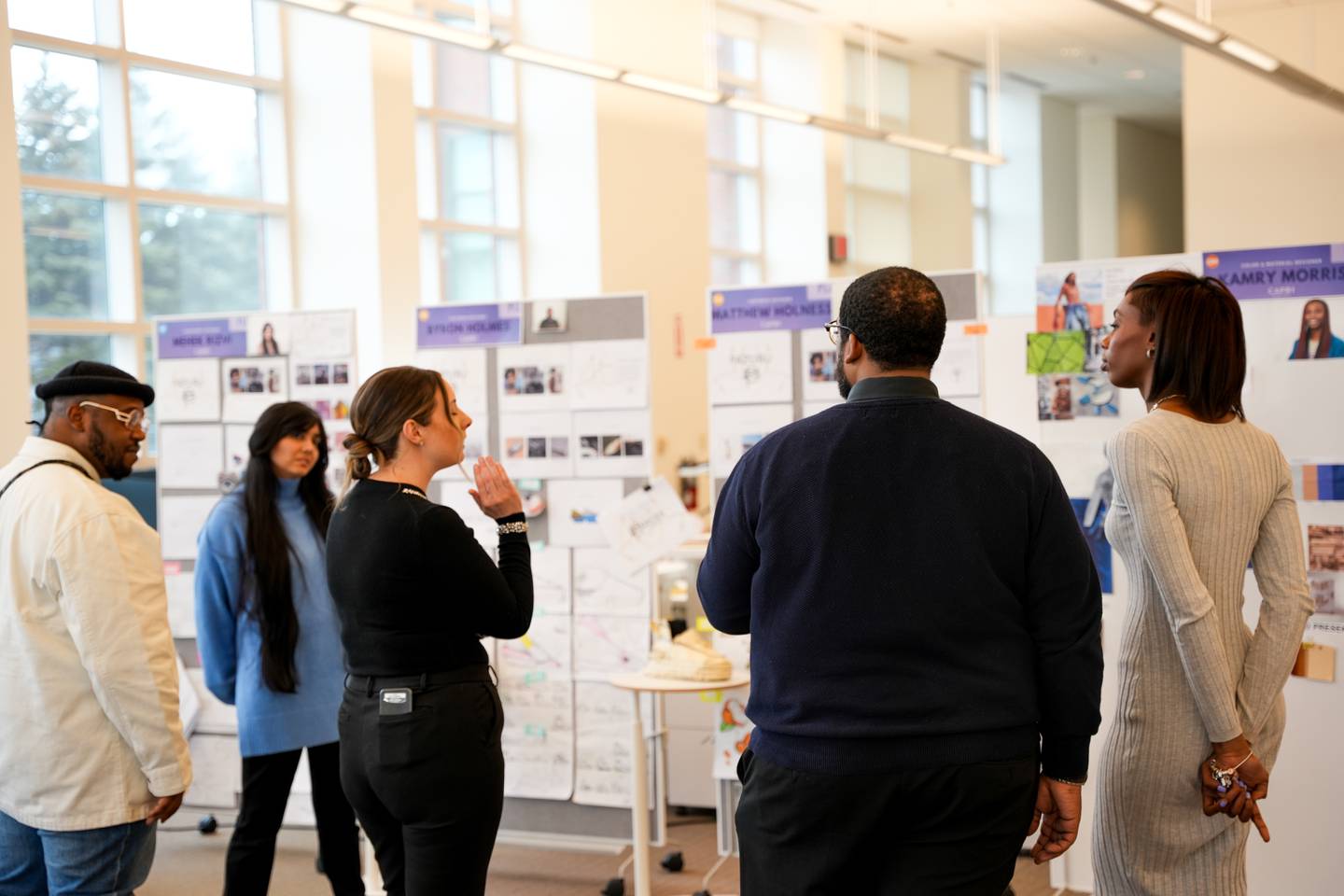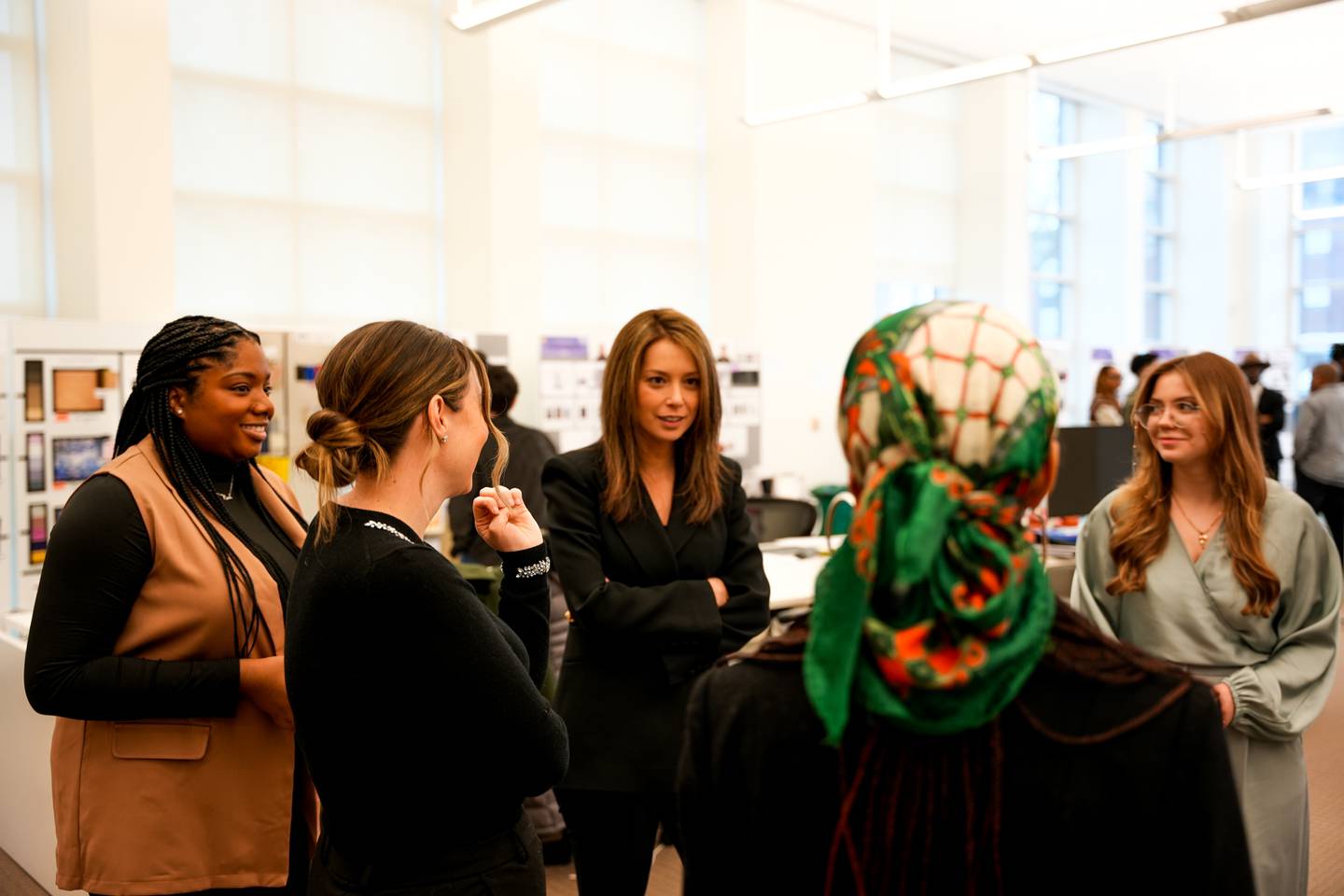
Last month, 16 students completed a five-week footwear and accessories design “masterclass,” at Pensole Lewis College in Detroit, Mich. The benefits included free tuition, room and board, face-time with executives from several major luxury fashion brands and, quite possibly, a job.
“It’s really like a five-week job interview,” said D’Wayne Edwards, founder of Pensole Lewis College and a veteran footwear designer. “Most kids don’t even get that far. So [we] help get them there. Then, it’s on you [the student] to build those relationships.”
The Capri Holdings Foundation for the Advancement of Diversity in Fashion, an arm of the parent of Versace, Jimmy Choo and Michael Kors — sponsored the programme and paid for the students’ room and board. At the end of the course, the company offered a handful of internships and will keep the line open with Edwards for hiring recommendations, he said.
But the students, most of whom are BIPOC — a huge part of Pensole’s mission is to level the playing field for minorities in the fashion industry — aren’t the only ones benefiting.
For the brands, courses like these are akin to “having their own college” whereby they get to build inroads with talent and train and develop them to meet whatever needs (and skill gaps) exist in their organisations right now and in the future, Edwards said. For instance, instructors at Pensole work with the brands to “co-create” curriculum that’s tailored to precisely how the company operates, he said.
This sort of intensive, early career training is something of a lost art in retail. In the ‘80s and ‘90s, department stores like Bloomingdales, Sears and Federated Department Stores (now Macy’s) were known for their executive and merchandising training programmes that taught the basics of operations, product development and retail strategy, as well as soft skills like effective communication, organisation and multi-tasking.
Such courses, which could last up to 18 months, also helped participants — often recent college graduates and early career professionals — touch multiple parts of a retail business and gain an awareness of the value and longevity of a retail career, said Paula Reid, president of executive search firm Reid & Co. Macy’s CEO Jeff Gennette and Bandier President Kimberly Minor both graduated from Macy’s executive training programme in the 1980s.
Over the past couple decades, many of these programmes have “[fallen] by the wayside,” she said, often a victim of cost cutting by struggling department stores. (Sears, for instance, went bankrupt and shuttered stores in 2018.) Some retailers, including Macy’s, still operate internal training programmes. However, many companies have instead relied on fashion and retail programmes at universities to supply new talent, giving up the ability to tailor the skills being taught to their business’ individual needs.
At the same time, new advancements in technology coupled with consumer and shareholder expectations for fashion firms to be more diverse and sustainable have created a need for a whole new sets of skills. Programmes like Pensole’s — and others that are cropping up across the industry at pace — reflect a growing awareness among fashion firms that the best solve for skills gaps are to prevent them in the first place.
“What’s happening industry wide right now is the companies are realising that they can’t just get a student straight from school,” Edwards said. “For one, they may be lacking the necessary technical skills needed to hit the ground running — or, two, they lack the maturity and [soft skills] to work in that company’s environment.”
Developing the Solutions
While many companies still recruit from colleges and universities, they’re increasingly finding that they’ll need to take a more active role in the education process if they’re going to prevent skills gaps that exist at graduation or that crop up much later in the pipeline, experts say.
“People who are graduating from traditional fashion programs are entering a workforce that could be foreign to anything that they’ve worked on,” said Jessica Couch, co-founder of retail tech research firm Fayetteville Road and curriculum advisor for fashion technology programs at Cornell University and Parsons.
Nordstrom in January launched a new curriculum track at Morehouse, a historically Black college in Atlanta, offering courses such as Computing Career Exploration and Intro to Tech Product Management, featuring the department store’s leaders and executives as regular guest speakers and advisors. That same month, SMCP Group, the French holding company for ready-to-wear labels Sandro, Maje, Claudie Pierlot & De Fursac, unveiled a training academy for sales associates, dubbed SMCP Retail Lab. Like Nordstrom, the year-long programme is in partnership with existing colleges Ema Sup Paris and Institut Français de la Mode.
At Pensole, Edwards designs the programmes like “a trade school,” where he’s meshing technical skills — like how to stitch together the upper part of a sneaker using sustainable materials — with soft skills like “how to behave in a corporate environment,” he said.

“When we worked with Capri, we co-created the course outline and the checkpoints,” Edwards said. “The students are actually learning exactly the way Capri works and what they are going to be expected to behave like when they get there.”
This month, Pensole will welcome another 10 students who will take part in a similar programme like the one the school offered with Capri. This time, the course will be virtual (to be more global) and sponsored by the Coach brand, which will fund room and board for participants when they fly to New York to meet with executives to show off the designs they dream up during the free six-week course.
For skills gaps at the management level and higher, companies must create programmes that help leaders develop a balance of “both the art and science” of retail as well as gain a broader view of the business beyond their respective focus areas, Reid said. For example, someone who’s working in supply chain or marketing should touch other parts of the business via cross-training or regular workshops.
“A lot of this comes down to that partnership between industry and education,” Edwards said. “It just helps companies get closer to the talent that they want. And when they do get that talent they’re more ready to work as soon as they step foot in the door.”



